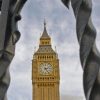
Efforts to curb the Covid pandemic in Europe are being complicated by political upheaval in Italy, lockdown protests in the Netherlands, a continuing surge in cases in Spain, and rows about the delivery and export of vaccines as fears rise over new variants of the virus.
Italy’s attempts to emerge from the pandemic suffered a setback after the country was plunged into political crisis after the resignation of the prime minister, Giuseppe Conte.
Conte remains in a caretaker role and might be given a fresh mandate by the president, Sergio Mattarella, to form a broader alliance in the coming days.
Italians are living under a tiered system of restrictions, which were reinstated after varying levels of lockdown during the Christmas and new year period.
The majority of the country’s 20 regions are now in the “orange zone”, which means bars and restaurants are only open for takeout services and people are barred from leaving their towns unless for work or emergency reasons, while two are in the harsher “red zone”. Inter-regional travel is still banned.
Italy reported 541 coronavirus-related deaths on Tuesday, up from 420 the day before, the health ministry said, while the daily tally of new infections rose to 10,593 from 8,561.
Spain reported 591 deaths on Tuesday – the highest single-day toll of the current third wave of the virus – and 36,435 new cases.
The number of cases of the virus for each 100,000 people over the past 14 days rose from 885 on Monday to 893.9 on Tuesday.
Fernando Simón, Spain’s health emergencies chief, said intensive care units were being stretched to their limits and warned of a very sharp rise in cases that could be traced to the Christmas and new year period.
The health minister, Salvador Illa, stepped down from his post on Tuesday to begin his run as the Socialist party’s candidate in next month’s Catalan regional elections. The prime minister, Pedro Sánchez, announced the current regional policy minister, Carolina Darias, as Illa’s successor as health minister.

Illa’s departure prompted Pablo Casado, leader of the opposition conservative People’s party, to accused Sánchez of putting politics before public health.
“Spain again hits record Covid infections over the weekend, with 767 dead and 93,822 cases,” he tweeted. “It is intolerable that Sánchez is more concerned with garnering votes than saving lives.”
Spain has recorded 2,629,817 cases and 56,799 deaths. It has so far administered 1,291,216 doses of the vaccine to its population of almost 47 million people.
Tensions over pandemic restrictions led to a third night of rioting in the Netherlands, where protesters rampaged through towns and cities after the government introduced a night-time curfew, which the prime minister, Mark Rutte, said was largely intended to target new, more infectious variants of the disease.
About 150 people were arrested on Monday in Amsterdam and Rotterdam, where shops were vandalised and looted, and the Rotterdam mayor, Ahmed Aboutaleb, issued an emergency decree giving police broader powers of arrest.
“These people are shameless thieves, I cannot say otherwise,” he said. “I had to threaten them with the use of teargas – a far-reaching measure. I find that sad, because I have never had to do that in my entire career as mayor.”
But trouble also flared in smaller centres around the country such as Den Bosch, Zwolle, Amersfoort, Alkmaar, Hoorn, Gouda – where several cars were set on fire – and Haarlem, where police were attacked with stones.

Officials said the rioters, who reportedly used social media apps to organise, were overwhelmingly teenagers. Experts questioned the extent to which many were motivated by opposition to the 9pm curfew, which came into force on Saturday.
A leading Dutch criminologist, Henk Ferwerda, said the riots involved “virus deniers, political protesters and kids who just saw the chance to go completely wild – all three groups came together”.
France remains in a holding pattern. According to presidential sources, Emmanuel Macron is “refusing to act under pressure” and wants to hold off announcing a third lockdown – considered a last resort – until there is more information on what effect the nationwide 6pm-6am curfew has had. The curfew was brought forward two hours only 10 days ago. “Before locking down again we have to be sure there are no other solutions,” a Macron aide said.
A meeting of the country’s health defence council will take place at the Elysée on Wednesday to take stock of the situation, with speculation mounting that an announcement from Macron could come later the same day.
Tuesday’s official figures showed an increase of 4,240 new Covid cases over the previous 24 hours and an additional 449 deaths.
There are now 26,888 people in hospital with the virus, an increase of 5% on the previous week. So far just over 1.09 million people have been given at least one dose of vaccine – about 66,000 of those on Monday.
In Germany, the government is discussing a massive reduction in flights into the country in an attempt to prevent more virulent Covid variants gaining a foothold.
“The risk posed by these virus mutations demands of us that we consider even drastic measures,” the interior minister, Horst Seehofer, told Bild newspaper. “They include stricter border controls, especially at frontiers with high-risk regions, but also a reduction of air traffic to Germany to almost zero, as Israel is currently doing.”
Meanwhile, the EU has threatened to bar exports of coronavirus vaccines to countries outside the bloc – such as Britain – after AstraZeneca was accused of failing to give a satisfactory explanation for a huge shortfall of promised doses to member states.
The pharmaceutical company’s new distribution plans were said to be “unacceptable” after it “surprisingly” informed the European commission on Friday that there would be significant shortfalls on the original schedule.























































Свежие комментарии